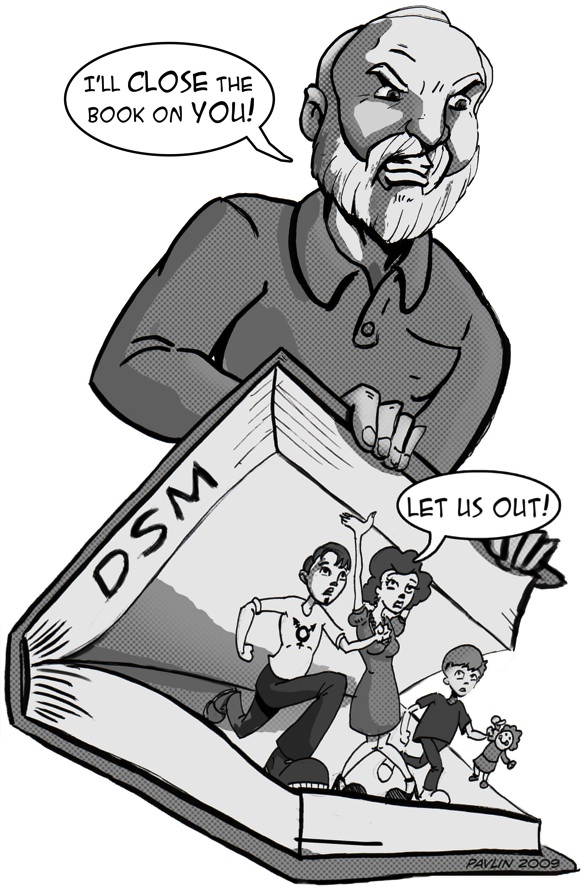Lesson 3: Clinical Assessment and Diagnosis
Attention
This chapter introduces you to the various forms of assessment that psychologists and other healthcare professionals utilize to determine a diagnosis. It also discusses the pros and cons of using a classification system such as the Diagnostic and Statistical Manual of Mental Disorders (DSM) or the International Classification of Diseases (ICD) to organize and disseminate diagnostic labels. We will focus on the use of the DSM for the remainder of the semester.
We don't however, want this process to come across as depicted in this cartoon!

Learning Outcomes
Upon completion of this lesson's material, students will be able to:
- Conduct a Psychosocial Intake Interview.
- Identify Objective and Projective Personality Assessment and Intelligence testing instruments and their limitations.
- Develop a rudimentary ability to discuss the DSM and the issue of labeling.
Teaching
Chapter 3-Clinical Assessment and Diagnosis
You have been suffering for a long time. Some suggests that you go to a clinical Psychologist to seek help. This is a mental health professional with a Ph.D. or Psy.D. who specializes in the assessment, diagnosis and treatment of mental disorders. In most states, he or she cannot prescribe medication; yet, this may change in the near future. How does this doctor know what you are suffering from? What about blood tests for depression? Nope. What about an MRI, PET or a CT scan of the brain to find out whether you are depressed. While we are getting closer, we are not there yet. What about a physical exam to find out why you are depressed? Yep! Before starting psychotherapy, a good psychologist would require you to see your medical doctor to check out possible physical reasons for the symptoms first (i.e. hormonal changes, brain tumors, head injuries, medication side-effects, diseases, etc). After all, you may be suffering from diabetes rather than depression. One of the most common effects of low insulin levels can be depressive symptomatology. Maybe, once the insulin level is corrected, much, if not all, of the depression will abate. Maybe it won’t. At that point, at least we know you have a medical condition that you were unaware of. If all potential physical etiology is ruled out, then we start looking for other causes.
Clinical Psychologists are trained in how to assess depression (and other psychological disorders) by utilizing clinical interviews (also called Psychosocial intake interviews), and psychological testing. Once completed, the psychologist completes a report that gives the findings and recommendations for treatment (sometimes called a treatment plan). Not everyone who presents for help from a psychologist will need to go through psychological testing. Sometimes, a clinical interview is sufficient to formulate a diagnosis and a treatment plan.
Assessment
Lesson 3 Assignment A- Case Study
Review the case study by clicking HERE. Write a brief paper answering the questions listed at the end of the case study.
Click HERE to download the Interpretations for Scores on the Scales in the MMPI (You will need to this to answer one of the questions in the Case Study.
Lesson 3 Assignment B- Biopsychosocial Assessment Interview
I want you to get the feeling for what is like to conduct a clinical interview (also called Intake Interviews/ Psychosocial Intake Interviews, Biopsychosocial Intake Interviews, etc). Select a person that is willing to trust you with some personal information in a confidential manner and interview them with the questions below.
Please do NOT reveal the true name or identifying information on the individual. You will use fictitious information in this area of the assessment. Please instruct your volunteer to NOT reveal embarrassing or highly personal information. They are free to “make up information” during more sensitive sections of the interview.
Click HERE to download the Biopsychosocial Assessment Intake form
This is in RTF Format so you can write into it directly on your computer
You will submit this completed document to the drop box
Lesson 3 Discussion
1. You recently completed a clinical interview (biopsychosocial interview). What was it like to gather this information? Do you think that you would have enough data to make a diagnosis using this alone? Why or Why not?
3. Reread the section titled "A Caution About Labeling and Stigma" on page 92. If we end up diagnosing Stella with Panic Disorder with Agoraphobia, how could this label affect her life? Should we abandon labels? Why or why not?